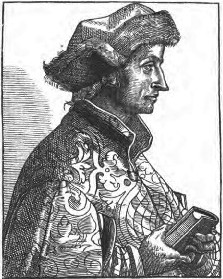1509 - Barclay, Alexander - Ship of Fools (3)
| Allusion | |
|---|---|
| Date | 1509 |
| Author | Barclay, Alexander |
| Title | The Ship of Fools |
| Mentions | Gest or tale of Robin Hood; Philip Sparrow; [John Skelton] |

By Henrik Thiil Nielsen. 2013-07-28. Revised by Henrik Thiil Nielsen, 2021-01-07.
Allusion
Holde me excusyd: for why my wyll is gode
Men to induce vnto vertue and goodnes
I wryte no iest ne tale of Robyn hode
Nor sawe no sparcles ne sede of vyciousnes
Wyse men loue vertue, wylde people wantones
It longeth nat to my scyence nor cunnynge
For Phylyp the Sparowe the (Dirige) to synge.[1]
IRHB comments
Alexander Barclay's Ship of Fools, published 1509, is a Scottish rendering of Sebastian Brandt's Narrenschiff. Jamieson, the editor of the 1874 edition of The Ship of Fools, discusses Barclay's animosity towards Skelton[2] – the last line cited above is a dig at Skelton's Philip the Sparrow – and mentions Barclay's lost work Contra Skeltonum. He suggests Barclay may have been irked by Skelton's satirical comments on priests.
This allusion together with Skelton's appearance as a character in Anthony Munday and Henry Chettle's Downfall of Robert Earle of Huntington (1599) led Paula Neuss,[3] among others, to suggest that Skelton had written something about Robin Hood. The explicit mention of a "iest" of Robin Hood makes it tempting to go further and suggest that Skelton was in fact the author of A Gest of Robyn Hode. The temptation becomes the greater when one remembers that Skelton was tutor to Prince Henry, the future Henry VIII, a monarch who was fond of both archery and Robin Hood. It must, however, be noted that Barclay has two more, quite similar, allusions to Robin Hood which do not mention Skelton, and since "gest" at this time meant an entertaining narrative poem, "iest [...] of Robyn hode" may refer to a kind of poem rather than the specific text that has come down to us. Still, I would not be surprised if it was discovered that Skelton was in fact the author of the poem. He is the best candidate we have.[4]
Editions
- Barclay, Alexander, adapt.; Brandt, Sebastian; Locher, Jakob, transl. Venerandissimo in Xp̄o Patri ac dn̄o: dn̄o Thome Cornisshe [...] Alexander Barclay suiipsius recōmendacionē ... This Present Boke Named the Shyp of Folys of the Worlde was Translated ī the College of Saynt Mary Otery in the Counte of Deuonshyre: out of Laten, Frenche, and Doche Into Englysshe Tonge (London in Fletestre [sic] at the signe of Saynt George, 1509). First edition.
- Barclay, Alexander, adapt.; Brandt, Sebastian; Mancini, Dominic; Piccolomini, Enea Silvio; Mantuanus, Baptista Spagnuoli; Locher, Jakob, transl. Stultifera Nauis, Qua Omnium Mortalium Narratur Stultitia [...] È Latino Sermone in Nostrum Vulgarem Versa [...] The Ship of Fooles, Wherin is Shewed the Folly of All States, with Diuers other Workes Adioyned Vnto the Same [...] (Imprinted at London in Paules Church-yarde, 1570).
- Barclay, Alexander, adapt.; [Brandt, Sebastian]; [Jamieson, Thomas Hill], ed. The Ship of Fools (Edinburgh; London, 1874), vol. II, p. 331.
Lists
- Not included in Dobson, R. B., ed.; Taylor, J., ed. Rymes of Robyn Hood: an Introduction to the English Outlaw (London, 1976).
- Sussex, Lucy, compil. 'References to Robin Hood up to 1600', in: Knight, Stephen. Robin Hood: A Complete Study of the English Outlaw (Oxford, UK; Cambridge, Massachusetts: Blackwell, 1994), pp. 262-88, see p. 269. Cites the three allusions to Robin Hood that occur in this work, noting that the last line includes a satirical attack on John Skelton.
Background
- Carlson, David R. 'Skelton and Barclay, Medieval and Modern', Early Modern Literary Studies 1.1 (1995): 2.1-17.
- Schultz, John Richie. 'The Life of Alexander Barclay', Journal of English and Germanic Philology, vol. XVIII (1919), pp. 360-68.
- Wikipedia: Alexander Barclay.
Also see
- Gest of Robyn Hode
- 1509 - Barclay, Alexander - Ship of Fools (1)
- 1509 - Barclay, Alexander - Ship of Fools (2)
- 1513 - Barclay, Alexander - Fourth Eclogue.
Notes
- ↑ Barclay, Alexander, adapt.; [Brandt, Sebastian]; [Jamieson, Thomas Hill], ed. The Ship of Fools (Edinburgh; London, 1874), vol. II, p. 331.
- ↑ op. cit., vol. I, pp. lxxviii, lxxx-lxxxii.
- ↑ Skelton, John; Neuss, Paula, ed. Magnificence (Manchester; Baltimore, MD, 1980), p. 88, n. to l. 357. See 1515 - Skelton, John - Magnificence.
- ↑ Note also that Skelton's Why come ye not to Court (1522) mentions Wentbridge, which also figures in the Gest of Robyn Hode and Robin Hood and the Potter.
